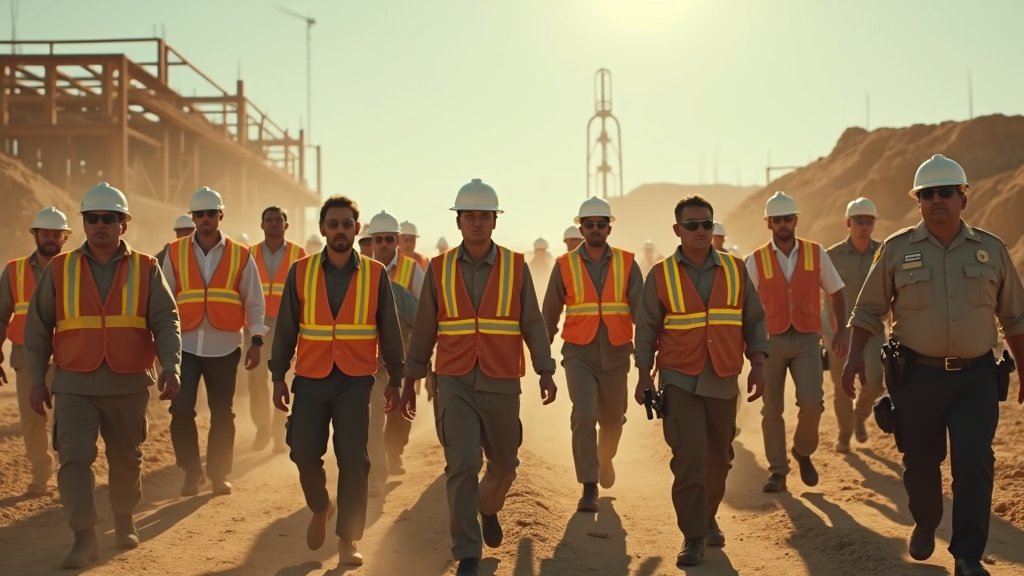LOS ANGELES, CA — Undocumented immigrants across California and the United States, particularly within the large community residing in Los Angeles, are reportedly undertaking stringent self-imposed lockdowns in direct response to recent, intensified enforcement raids conducted by the Trump administration.
The pervasive fear of arrest and subsequent deportation has transformed routine daily activities – including the simple act of taking children to school, purchasing groceries, and driving – into daunting, high-risk endeavors. This climate of apprehension is forcing many to make agonizing choices between engaging in essential life tasks and minimizing their exposure to potential immigration authorities.
Personal Costs of Apprehension Fear
The chilling effect of these operations is palpable, impacting the health and well-being of individuals. One documented case involves an undocumented man from Guatemala who is battling leukemia. His profound fear of being apprehended during a hospital visit has reportedly caused him to postpone vital chemotherapy treatments, prioritizing perceived safety from deportation over critical medical care.
Similarly, the constant specter of raids has led to heartbreaking preparations within families. A Mexican grandmother, deeply integrated into her community, has reportedly begun packing her belongings, living with the immediate possibility of being forcibly removed from her home and family at any moment.
Impact on Community Institutions
The retreat indoors is not confined to individual households; it is significantly altering community life and participation. A prominent Pentecostal church located in East Los Angeles, under the leadership of Pastor Carlos Rincon, has experienced a dramatic shift in its congregation’s engagement. The church, with an approximately 400-person in-person membership rooted in countries including Guatemala, Mexico, El Salvador, and Honduras, has seen nearly half of its members cease attending weekly services.
In place of physical attendance, there has been a notable increase in viewership of the church’s livestreamed services, reflecting a community seeking spiritual solace and connection while remaining physically isolated out of fear.
Healthcare access, already a challenge for many undocumented individuals, has been further complicated. A clinic network that serves large populations across L.A., the Inland Empire, and the Coachella Valley has reported a significant disruption in patient care. Since the raids began, over a third of the clinic’s patients have reportedly missed or canceled scheduled appointments.
In response to this alarming trend, the clinic is adapting its service delivery models. Some patients are transitioning to telehealth consultations, while others are opting for home visits to avoid venturing outside. Jim Mangia, the clinic’s chief executive, confirmed the organization is actively expanding its capacity by adding another home visitation team to meet the growing need for in-home care.
Expert Analysis and Community Response
Experts and advocates view the situation with deep concern. Victor Narro, a professor and project director for the UCLA Labor Center, offered a stark assessment, describing the current state of affairs as “a harmful form of racial profiling combined with the suspension of constitutional rights and due process.” His analysis underscores the perception that enforcement actions are not solely focused on individuals with criminal records but are creating a climate of fear that broadly impacts the undocumented community, regardless of individual circumstances.
In the face of this widespread fear and isolation, community coalitions and immigrant support organizations are stepping up efforts to provide assistance. These groups are working to offer resources, legal information, and support networks for immigrants who feel compelled to remain hidden to protect themselves from potential detention and deportation.
The current environment in Los Angeles and other areas experiencing heightened immigration enforcement illustrates a profound societal impact, where the fundamental right to safety from arbitrary detention is forcing many undocumented residents to trade their freedom of movement and access to essential services for the perceived security of remaining out of public sight.





